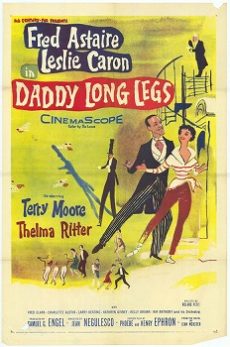
Hollywood On 52nd Street
Something’s Gotta Give was composed by Johnny Mercer for his friend Fred Astaire who starred in the 1955 film Daddy Long Legs. It is the love song duet between him and Leslie Caron. The song playfully uses the irresistible force paradox – which asks what happens when an irresistible force meets an immovable object – as a metaphor for a relationship between a vivacious woman and an older, world-weary man. The man, it is implied, will give in to temptation and kiss the woman.
The film also stars Terry Moore, Thelma Ritter, Fred Clark, and Ray Anthony who appear as himself with his orchestra. Filming took place on location at 20th Century Fox Studios in Hollywood and the Andrew Carnegie Mansion in Manhattan.
The Story: On a trip to France, millionaire Jervis Pendleton III (Astaire) sees an 18-year-old girl Julie Andre (Caron) in an orphanage. Immediately enchanted with her, but mindful of the difference in their ages and what the press may report should his involvement be discovered, he anonymously sponsors her to attend a fictional college in New England. She writes him letters, which he doesn’t read. After 3 years, he goes to visit her at a dance, not telling her that he is her benefactor. They fall in love, but the usual movie-type difficulties get in the way before they can get together at the end.
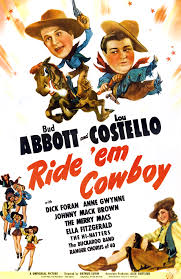
Hollywood On 52nd Street
I’ll Remember April is a jazz standard with music written by Gene de Paul, and lyrics by Patricia Johnston and Don Raye. The song made its debut in the 1942 Abbott and Costello comedy Ride ‘Em Cowboy starring the comedy team along with Dick Foran, Anne Gwynne, Johnny Mack Brown, Ella Fitzgerald, Samuel S. Hinds, Douglas Dumbrille, and Morris Ankrum. The film was directed by Arthur Lubin, the song was sung by Foran. Musical numbers were staged by Nick Castle.
The song’s story is about a romantic relationship ending. The lyric uses the seasons of the year metaphorically to illustrate the growth and death of a romance. The lyric also uses the ideas of the hours in a day and the flames of a fire to illustrate a relationship growing stronger and subsequently losing strength.
The Story: The author of best-selling western novels, Bronco Bob Mitchell (Dick Foran), has never set foot in the west. A newspaper article has exposed this fact to his fans, and his image is suffering because of it. He decides to make an appearance at a Long Island charity rodeo to bolster his image. When a steer escapes while he is riding a horse nearby, he is thrown. Not knowing what to do, a cowgirl, Anne Shaw (Anne Gwynne), comes to his rescue and saves his life by bulldogging the steer. Shaw gets hurt, retreats to her father’s dude ranch followed by Mitchell who eventually becomes a decent cowboy.
Cast Fact: This is Ella Fitzgerald’s first screen role, where she plays Ruby, who fills several roles as one of the employees of the ranch. At the opening rodeo, she is dressed as a rodeo clown and comes to Anne’s side when she is hurt. Later in the film, she can be seen removing an apron before singing. Ella sings A-Tisket, A-Tasket on the bus, as the ranch crew drives from the railway station to the ranch. Ruby and the other employees interact playfully during the song.
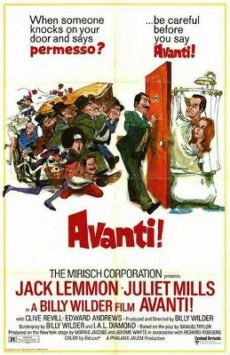
Hollywood On 52nd Street
Senza Fine which translates in English to Endless was written by Italian singer-songwriter Gino Paoli, inspired by collaboration partner Ornella Vanoni, who was signed to Memory Records. The label wanted to rebrand the singer with a new sexy image, detaching her from her previous one. The song was composed in 1961, and not specifically for the movie Avanti! but was chosen to be the soundtrack.
Senza Fine is performed in the 1972 film Avanti!, an American/Italian comedy film produced and directed by Billy Wilder. The film stars Jack Lemmon and Juliet Mills. The screenplay by Wilder and I. A. L. Diamond is based on the play of the same name by Samuel Taylor, which had a short run on Broadway in 1968. It was produced at a time when the censors were more lenient, allowing her naked breasts and his and her naked backside to appear in the film.
The Story Ten years have elapsed since Baltimore industrialist Wendell Armbruster, Sr. first began spending a month at the Grand Hotel Excelsior in the Island of Ischia on the Bay of Naples, in Italy allegedly to soak in the therapeutic mud baths for which the resort island is known. When he is killed in an automobile accident, his straitlaced son Wendell Armbruster, Jr. flies to Italy to claim his father’s body. Upon arrival, he discovers his father had a British mistress, whose free-spirited London shop girl daughter, Pamela Piggott, was fully aware of their parents’ clandestine romance. Wendell’s plan was to return his father’s body back to Baltimore in time for burial in just three days’ time for a huge funeral service. Complications arise including kidnapping, blackmail, murder, a host of government forms and an affair, but with the assistance of hotel manager Carlo Carlucci, they attempt to smooth things over, as he takes on all the arrangements for the body to be taken. J.J. Blodgett of the State Department gets a call from Jr.’s wife and flies in from Rome to come to the rescue. He moves to get the body back to the States for the funeral under the guise of Sr. being a diplomat. In the end, all works out and a new rendezvous is created.
The Cast starred Jack Lemmon as Wendell Armbruster, Jr., Juliet Mills as Pamela Piggott, Clive Revill as Carlo Carlucci, Edward Andrews as J.J. Blodgett, and Gianfranco Barra as Bruno. The supporting cast was Franco Angrisano as Arnoldo Trotta, Franco Acampora as Armando Trotta, Giselda Castrini as Anna, the waitress, Pippo Franco as Matarazzo, Janet Agren as Nurse, Giacomo Rizzo as Barman, Antonino Faà di Bruno as Concierge, Raffaele Mottola as Passport Officer, Harry Ray as Dr. Fleischmann, Ty Hardin as U.S.Navy first helicopter pilot.
More Posts: history,hollywood,instrumental,jazz,music,Street,vocal
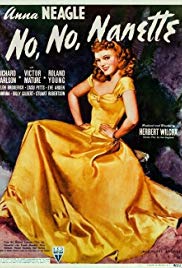
Hollywood To 52nd Street
I Want To Be Happy and Tea For Two are two compositions that received a third set of bows when they appeared in the 1940 Hollywood musical comedy remake of No, No, Nanette. The music was composed by Vincent Youmans, with lyrics by Irving Caesar and Otto Harbach. The film was based first on Frank Mandel’s 1919 Broadway play My Lady Friends, which would become the 1924 Chicago hit play No, No, Nanette before landing on Broadway in 1925. Then in 1930 the play became a film, with its most successful remake in the 1940 film.
The Story: Perky young Nanette attempts to save the marriage of her uncle and aunt by untangling Uncle Jimmy from several innocent but ensnaring flirtations. Attempting one such undoing, Nanette enlists the help of theatrical producer Bill Trainor, who promptly falls in love with her. The same thing happens when artist Tom Gillespie is called upon for help. But soon Uncle Jimmy’s flirtations become too numerous, and Nanette’s romances with Tom and Bill run afoul. Will Uncle Jimmy’s marriage survive, and who will Nanette find happiness with?
The 1940 film starred Anna Neagle, Richard Carlson, Victor Mature, Roland Young, Helen Broderick, ZaSu Pitts, Eve Arden and Billy Gilbert. Supporting cast included Tamara, Stuart Robertson, Dorothea Kent, Aubrey Mather, Mary Gordon and Russell Hicks.
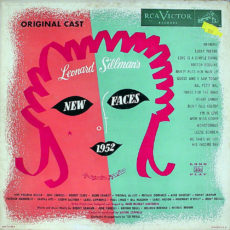
Hollywood On 52nd Street
Guess Who I Saw Today is a popular jazz song composed by Murray Grand with lyrics by Elisse Boyd. The song was originally composed for Leonard Sillman’s Broadway musical revue New Faces of 1952 in which it was sung by June Carroll.
The revue opened on Broadway at the Royale Theatre on May 16, 1952 and ran for 365 performances. It was produced by Leonard Sillman, directed by John Murray Anderson and John Beal with choreography by Richard Barstow. The sketches were written by Ronny Graham and Brooks. The songs were composed by, among others, Harnick, Graham, Murray Grand and Arthur Siegel.
The cast featured Graham, Kitt, Clary, Virginia Bosler, June Carroll, Virginia De Luce, Alice Ghostley, Patricia Hammerlee, Carol Lawrence, Paul Lynde and Bill Milliken. De Luce and Graham won the 1952 Theatre World Award. The revue marked Kitt’s Broadway debut, singing a sultry rendition of “Monotonous”, about how boring a life of luxury was.
Two years later, the name was abridged to New Faces and was adapted into a motion picture filmed in Cinemascope and Eastmancolor and was released by 20th Century Fox on March 6, 1954. It helped jumpstart the Hollywood careers of several young performers including Paul Lynde, Alice Ghostley, Eartha Kitt, Robert Clary, Carol Lawrence, Ronny Graham, performer/writer Mel Brooks (as Melvin Brooks), and lyricist Sheldon Harnick.


